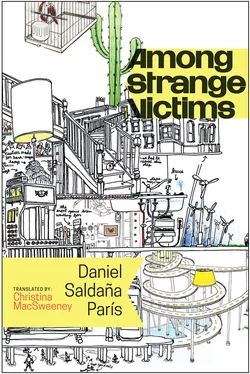The only open cantina they came across had a more dubious air than the one they had left, although to an inexperienced eye, it might have been the very same cantina, which is exactly what Daga said when they looked inside: “It’s the same cantina.” In any case, they decided to try their luck and went in. It was much more crowded than the other and was so noisy that all three of them, without saying so, felt sheltered in some form of anonymity. They found an empty table, and when they sat down, after borrowing another chair, Rodrigo thought he had no clue what he was doing there. This cantina also had a jukebox, and the music it was pumping out seemed like an exact copy of the other: boleros about the stoical endurance of the nostalgia for a lost joy. It was obvious he wasn’t going to get either of these girls into bed, much less the two of them together, nor did it seem probable that their conversation would be particularly enlightening. He considered beating a retreat but was beset by a vague sense of guilt and decided to stay with them for at least a while longer, so as not to leave them at the mercy of the drunks.
But his guess that the drunks would keep their distance on seeing him sitting with the foreign girls was completely mistaken. They hadn’t finished their first beer before a short guy, his head almost shaven, wafted beery breath in his face, shouting into his ear a request to be introduced to his friends. Rodrigo didn’t know how to react and chose what was, perhaps, the worst possible option: he said they weren’t his friends, that he’d only just met them, and didn’t think they were interested in doing anything or getting to know anyone. Seeking complicity with the drunk, he said he’d already tried it on one of them and been told to fuck off, and they’d also told him they had big gringo boyfriends who were coming to pick them up a little later in another bar.
The drunk with the almost shaven head and the obstinacy of someone used to getting his way continued to insist, even though he appeared to have swallowed Rodrigo’s explanation and taken the bait of the sham friendship. Forgetting about his prey for a moment, he pulled up his chair until he was practically on Rodrigo’s lap and began telling him about isolated episodes from his life. He had a fat wife, and a daughter he was proud of, whose picture he had as the background image on his malfunctioning cell phone. He was a state policeman, and if Rodrigo had any problems during his stay in Los Girasoles, he just had to mention his name, Oliver Rodríguez, to free himself from the injustice his colleagues shamelessly doled out. “You gotta grease the wheels if you wanna move,” the policeman pronounced, making it clear he also took advantage of outsiders to make it comfortably through to payday.
It needed a few more wiles to convince Oliver Rodríguez that the two gringas didn’t want to fuck him, and that he should leave the table of the impromptu trio and return to his solitary corner, where he knocked back a couple more drinks before departing — all the while talking to himself — through the wooden swinging doors leading to the street.
And it was while Rodrigo was watching, with relief, the departure of Oliver Rodríguez, the drunken policeman, that he saw Micaela cross the threshold in the opposite direction. The girl’s solitary presence in the doorway only lasted a second before Jimmie came in behind her and swept the room with the expert gaze of a person prepared for any eventuality. A second or two that, for Rodrigo, seemed to extend in time like a wet shirt thrown up by its extremities, two elastic seconds, or maybe three that seemed to last five or six of the seconds we normally experience, sometimes with greater shame than glory but always without the power to stop the passage of time, as he would have liked to have stopped it at that instant, because Rodrigo had forgotten about Domitile and Daga and thought the alcohol must have been adulterated, since there was no other way to explain the intense heat rising from his stomach and manifesting itself at the back of his throat as an extreme dryness, as if all the dust of Los Girasoles had been summoned to appear in his throat, as if someone had ordered a cemetery to be constructed in his mouth and people were throwing handfuls of earth onto the simple coffins of their most recent dead.
There are coincidences in real life that appear to be dictated by the cliché that rules songs of love and vengeance with an iron fist, and there are coincidences that appear to be neither forced nor gratuitous but essentially necessary, inevitable, and evident, and that no one, having experienced them, would dare say were the creations of an affectedly falsetto voice or an eccentric personality, but are, rather, events with undeniable religious echoes, even if these coincidences involve, as in this case, a song of love and vengeance issuing from a jukebox. Because as soon as the door of the cantina allowed the policeman to leave and set up the arrival of Micaela, suddenly, in the middle of a line, the song playing was interrupted and another began, as equally new to Rodrigo as its predecessor, but in some way related or foreseen, like those songs we hear one single time in our childhood and never again until the day they are played on the most unlikely radio program, and then we remember we have already lived that moment. The words of the song were clear, and the voice was not nasal, unlike all the others that had pulsed through the cantina. It was a female voice and a sad song, like the sad, female figure who entered at that moment through the wooden door and let her eyes wander in the semidarkness until they met with, at the darkest, most distant table, Rodrigo’s, in an elastic, unreal moment of more or less two seconds that both of them would remember as the clearest they had ever experienced. Because there are clear moments when the air really does seem to be a docile material that allows us to understand the world, and there are dirty, noisy moments when any degree of lucidity will be immediately held in check by the insipid material of things that impose themselves like symptoms of a very serious disease we all agree to call “world,” or “cruel world” if we are tragedians.
Micaela walked in and the gringo, Jimmie, appeared behind her, and when Jimmie appeared, Rodrigo understood just who those two people were — Micaela and Jimmie — since they couldn’t be anyone else and perfectly matched the description Marcelo Valente had offered a few days before when suggesting the possibility that Rodrigo join the hypnotism project, the project related to the future of art.
Rodrigo stared fixedly at Micaela’s crotch and joyfully told himself he would soon be drinking piss from that font of eternal youth, although he then thought he wouldn’t like to be young forever; youth was a nebulous, larval stage in which everything seemed more important, and nothing annoyed Rodrigo more than importance, as if he only aspired to a Nirvana of household appliances in which the greatest danger was buying a dishwasher on credit.
As soon as he saw Micaela, he became convinced it wouldn’t be such a bad idea to take part in the hypnotism project Marcelo had invited him to join a few evenings before. Jimmie and the girl sat at a nearby table, and he listened distractedly to Domitile, who was speaking a few inches away, her breath agreeably seasoned with alcohol.
 6
6 
A stabbing pain in his temple suggested the night had gone on much longer than necessary. Blurred images of things he regretted floated around in his head. He made an effort to impose a chronological order on that inferno that, by nature, responded to a different logic. Inebriation sets up shortcuts in time, and it might not be such a good idea to try to mold it into a sober form. But despite it all, Rodrigo attempted to do just that.
Читать дальше

 6
6 







